#and then there was the time France England and Germany banded together to invade the Netherlands (google rampjaar if your curious)
Explore tagged Tumblr posts
Text
The original post is extremely fake as anyone knowing anything about french history (and that includes Macron) knows.

I'm sorry what the fuck did you just say ??? This has to be fake.
#napoleon anyone?#and then there was the time France England and Germany banded together to invade the Netherlands (google rampjaar if your curious)#and the franco Prussian war of 1870#France also sponsored the American revolution
54K notes
·
View notes
Photo

April l was apparently the month for me to revisit some children’s authors who are steeped in controversy at the moment. So here’s my hot (well, lukewarm) takes on issues that absolutely do not need a single other person talking about them. Also some actual good books that I read this month!

Badger in the Basement
The Animal Ark books are a childhood classic — though I recently found out that apparently there’s a difference between American and British publications, and the American versions didn’t include a lot of actual COOL animals which is… bizarre. As a Canadian stuck in the middle of this, this nonsense drives me nuts. This one was about the main character, the daughter of pair of vets, trying to protect a local badger sett from men wanting to participate in badger digging and baiting. These books are always feel-good, and it was a nice single-day-read while I waited for a library book to come in.

Chi’s Sweet Home
The cutest manga series about the misadventures of a little kitten, Chi, who has been adopted by a loving family. I’ve never bothered to read them in order, but apparently this time I stumbled across the last in the series -- whoops! Still, stood on it’s own pretty easily, and it was a fun read! Things get tense when the family realize that they may have found Chi’s original home… and may have to give up Chi forever.

Earth Before Us: Dinosaur Empire!
This was an odd graphic novel, I feel like I’m not sure who the target audience was exactly. It was a nonfiction comic done in a Magic School Bus style, with the purpose of teaching current, up-to-date facts about the animals that lived in the Mesozoic Era. If you’re into dinosaurs, you’ll probably enjoy this! The art is absolutely adorable, I love the dinosaur illustrations, and I learnt some really neat facts. That being said, the pages are really dense, and there’s a lot of info crammed in… some of it will probably go way over a child’s head without specific additional teaching or a very strong personal interest. But that being said, a dinosaur obsessed kid is still probably going to really dig this… as would a dinosaur obsessed adult. It wasn’t my cup of tea exactly but I’m sure it is someone’s.
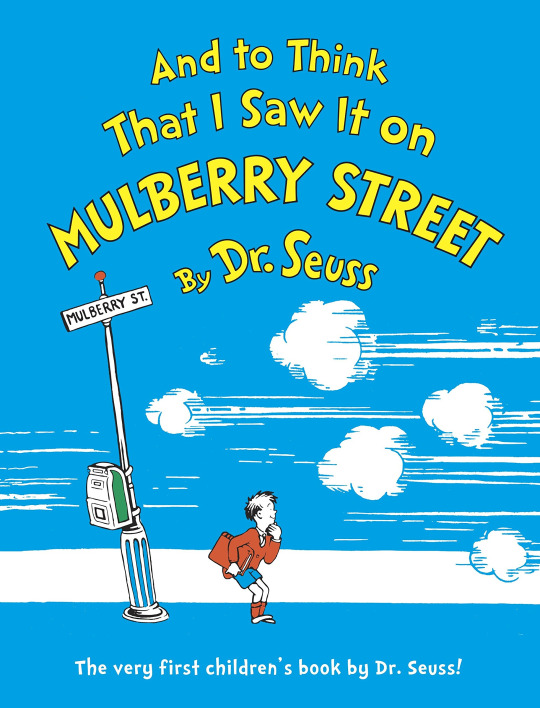
assorted Dr Seuss Books
I love these types of controversies because it means getting to listen to every moron who has never had an opinion on Dr Seuss ever start generating a mile of them out of the aether. So many people are so mad about the six books that are getting retired and I bet most of them haven’t even read them. These are not the friggin Cat In The Hat or The Lorax or even the likes of Yertle The Turtle. I was raised by a grade one teacher, was a voracious reader who loved Dr Seuss, and wrote my university thesis on children’s literature, and I still only knew two of the six books on that list. So by all means, if you want to write an essay explaining why those specific books are worth clinging to, feel free, but if you haven’t even heard of them maybe it’s not a big deal. *grumble*
Anyway, my grousing aside, it gave me the urge to reread a bunch of Seuss books, including the two retiring books I personally knew: McElligot’s Pool and To Think That I Saw It On Mulberry Street. I do still enjoy both, especially McElligot’s Pool which always sparked my imagination, but it’s obvious why they’re being retired and I personally think it’s the right choice. There’s so much good kidlit out there, we can survive without these.
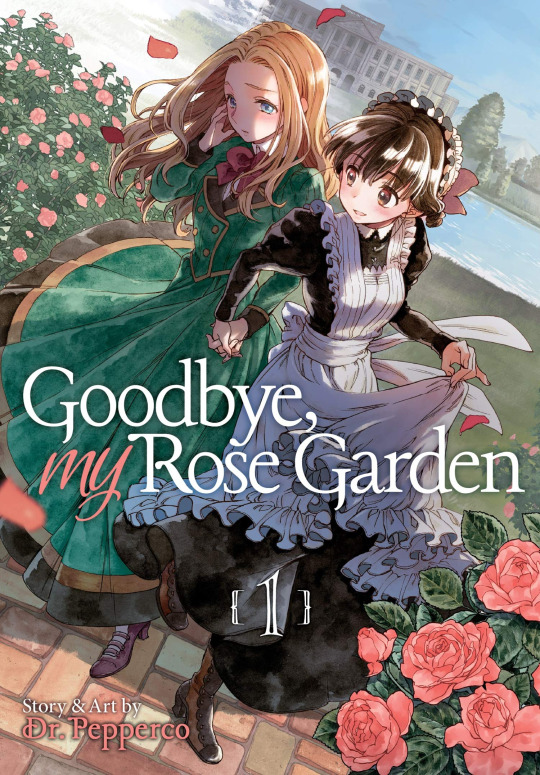
Goodbye, My Rose Garden
A f/f romance manga, fairly standard fair though cute if you’re looking for some historical angst, pretty dresses, and mutual pining. A young Japanese woman moves to England in the hopes of meeting a writer (Mr Frank) who she has long admired. Along the way she is employed by an enigmatic woman with plenty of money, rumours, and melancholy following her. I’ll be honest, uncut romance isn’t really my genre, but I’ll probably still try to the second book to see if the story picks up.
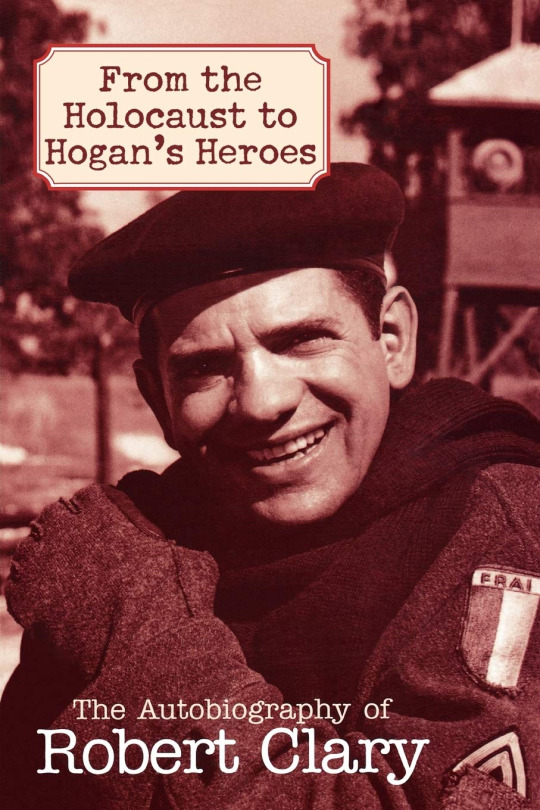
From The Holocaust to Hogan’s Heroes: The Autobiography of Robert Clary
It’s no secret that I’ve been on a Hogan’s Heroes kick. This is the autobiography of Roberty Clary, who plays my favourite character in the show, Louis Lebeau. And holy shit what a life this man has had. He was a Jew growing up in France before the start of the war, and who was one of many children taken away from his family and sent off to the concentration camps in Germany. This was an amazing, intense, inspiring, and heartbreaking read… it has Clary’s voice all over it, and it tells everything from the charming childhood he had, to the horrors of the concentration camps, the brutality of survival, and then about his exciting journey into the entertainment industry afterwards. It’s an experience, would recommend if you’re a fan of the show.
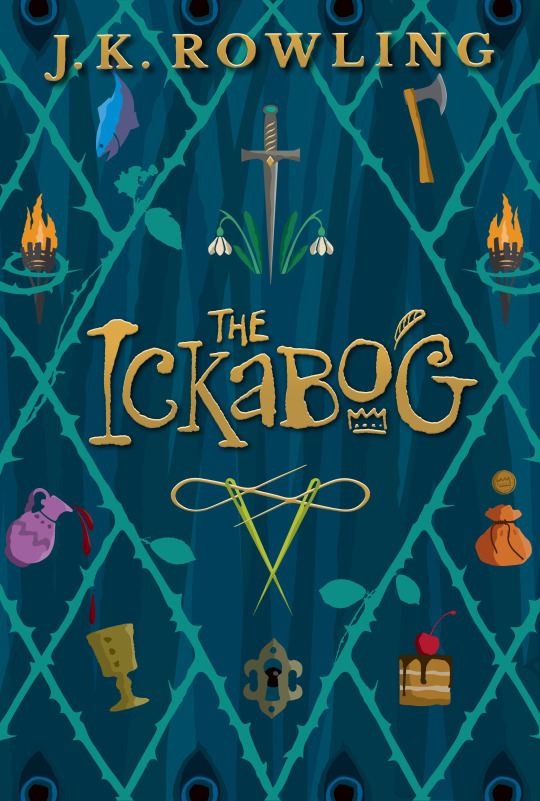
The Ickabog
The second controversial author I read this month. Originally I was going to give Rowling’s new book a miss, given everything that’s been going on over the past few years, but in the end my curiosity got the better of me. Politics aside, it was a fun read! Not groundbreaking, but enjoyable enough and written in an interesting style. It didn’t read the same as a lot of modern kidlit, it felt more like a cross between a classic fairytale and a Dahl book. Perhaps a bit like Despereaux. It tells the tale of how an idyllic country gradually falls into ruin through the ignorance, inaction, and greed, and how a supposedly fictional monster hides the very real, human monsters at the heart of the country. It was cute and pleasant and I’m glad I decided to get it from the library, though for anyone who is choosing not to engage for political reasons: you aren’t missing anything major.
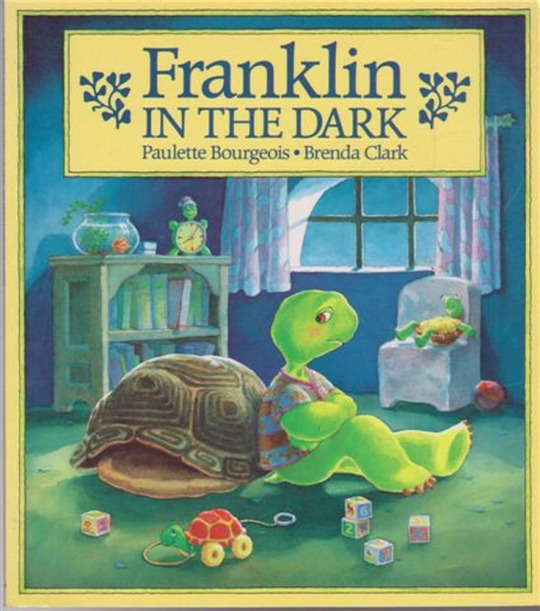
Franklin In The Dark
A Canadian classic. I don’t think there’s a single person my age who hasn’t read or been read a pile of these books, and the nostalgia is so comforting. I found this on Youtube and listened to someone read it to me, and honestly 10/10 would recommend for a calm evening.
The big reason I decided to seek this one out though, was because I finally got to the M*A*S*H episode that inspired this entire series! In the episode C*A*V*E, in which Hawkeye is freaking out over his claustrophia while the camp is forced to take shelter in a nearby cave during some intense shelling, he mentions that if he had been born a turtle he would have been afraid of his own shell, and that the other turtles would make fun of him cause he’d be forced to walk around in his underwear. And so this first story about a young turtle who’s afraid to sleep in his own shell and drags it around behind him. So if you were ever curious, Franklin the Turtle is in fact named after Dr Benjamin Franklin Pierce. (this is also why the French version is named Benjamin!)

Wolves of the Beyond: Lone Wolf
I loved the Guardians of Ga’Hoole books as a kid but I never read the Wolves of the Beyond series. This first book was an interesting read, Lasky does a great job creating worlds and societies for the animals that inhabit them. Lone Wolf is about a deformed wolf cub who was abandoned in the wilderness to die. And he would have, if a desperate mother bear, who had recently had her only cub killed, hadn’t stumbled across him and saved him, vowing to raise him as her own...
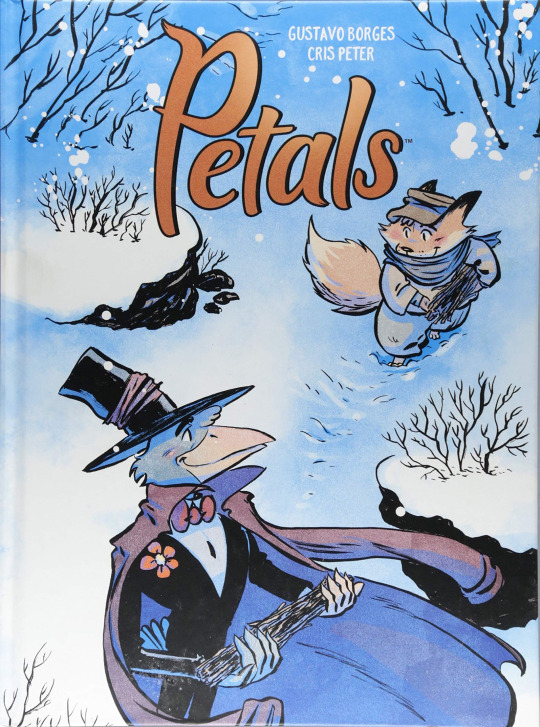
Petals
A “silent” graphic novel. It has beautiful artwork and is told entirely through pictures, no text at all. It’s loves and heart-wrenching, though it left me feeling somewhat unsatisfied… I felt like there should have been more. Still, a neat story.
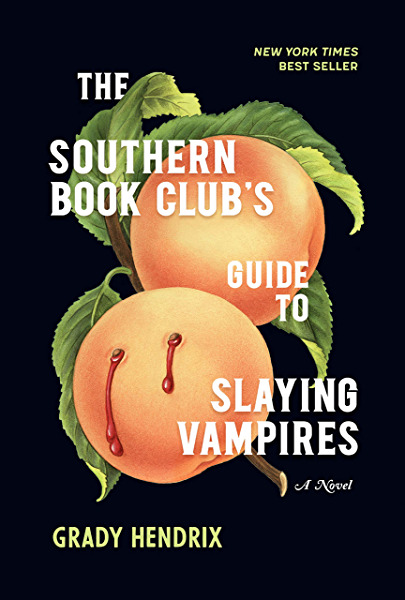
The Southern Book Club‘s Guide To Slaying Vampires
What a banger of a novel!! I can’t recommend this one enough. It’s about a group of suburban mothers in the ‘80s who form a book club out of a shared need for community and a love of grisly true crime novels. But when a strange drifter appears in town and starts setting down roots… and when children begin disappearing… these women need to band together to confront the horrors that have invaded their neighbourhood, and face down not only a terrifying monster among them but the patriarchal system that allows it to flourish. To quote the preface:
“Because vampires are the original serial killers, stripped of everything that makes us human — they have no friends, no family, no roots, no children. All they have is hunger. They eat and eat but they’re never full. With this book, I wanted to pit a man freed from all responsibilities but his appetites against women whose lives are shaped by their endless responsibilities. I wanted to pit Dracula against my mom. As you’ll see, it’s not a fair fight.“
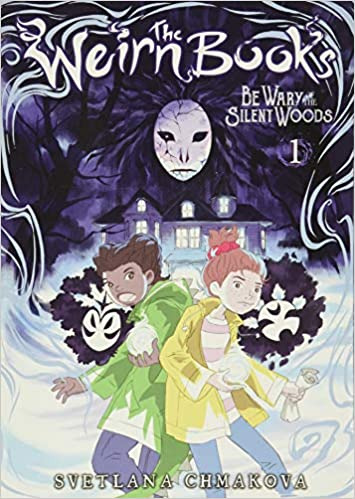
The Weirn Books: Be Wary of the Silent Woods
I love Chmakova’s graphic novels, though I’ve only ever read her slice-of-life middle grade series before. This one is pure fantasy and very fun. It’s about two cousin “weirns” — witches with demon familiars — who attend the local night school. Things get strange though when an ominous figure appears outside the old, abandoned school house deep in the Silent Woods, and begins tempting children down its path…
I’m very much looking forward to word of a second book and was honestly kind of surprised that I haven’t heard more about this book given how popular her other series is. This has all the same charm and quirks but for those of us who prefer stories based in fantasy rather than reality.
And A Bonus...
For some masochistic reason I got a Garfield book out of the library. Jeez, if I didn’t love these as a kid, I found them absolutely laugh out loud hilarious, and now I just don’t see it anymore. But here I will share the one strip in the book that actually made me laugh

#book review#book reviews#chatter#dr seuss#hogan's heroes#robert clary#the southern book club's guide to slaying vampires#animal ark#dinosaur empire#the weirn books#svetlana chmakova#canadian literature#canlit#kidlit#children's literature#wolves of the beyond#mash#franklin the turtle#chi's sweet home#manga#goodbye my rose garden#kathryn lasky#the ickabog#jk rowling
40 notes
·
View notes
Text
New world news from Time: The ‘Special Relationship’ Between the U.S. and U.K. Is Unlike Any Other Alliance. Here’s How It Got That Way
Though U.S. President Donald Trump’s visit to the U.K. this week has sparked protests, with hundreds of thousands planning to demonstrate in London on Friday, the relationship between those nations and their leaders is typically a close and friendly one. In fact, it’s so friendly — and, experts say, so unusual in its specifics — that it has its own name: the “special relationship.”
But why do we call it that? Why not just call it an alliance?
The phrase can be traced back to Mar. 5, 1946, when Winston Churchill addressed Westminster College in Fulton, Miss., where he and President Harry S. Truman received honorary degrees. (This is the same speech in which he famously used the metaphor of the “Iron Curtain” dividing capitalism in Western Europe and Communism in Eastern Europe — though he didn’t invent the term.)
Here’s what he said about the “special relationship”:
I come to the crux of what I have travelled here to Say. Neither the sure prevention of war, nor the continuous rise of world organisation will be gained without what I have called the fraternal association of the English-speaking peoples. This means a special relationship between the British Commonwealth and Empire and the United States… Would a special relationship between the United States and the British Commonwealth be inconsistent with our over-riding loyalties to the World Organisation? I reply that, on the contrary, it is probably the only means by which that organisation will achieve its full stature and strength.
Churchill emphasized the need for the two powers to band together against the Soviet Union, rebuilding the ravaged Europe so that it didn’t become one big Soviet satellite.
“The real purpose of the speech, more than anything else in my opinion, was to try to talk about the appalling economic problems that western Europe was suffering in ’46 [between the] terrible winter in Germany, people dying of starvation, Berlin devastated, flattened by bombing,” says historian Warren Kimball, author of Forged in War: Roosevelt, Churchill and the Second World War. “He’s there to ask the U.S. for economic help but never asks the question in a straightforward way, so he refers to the special relationship that U.S. and Britain had. We demonstrated how well we could work together during the war, so we could work together for the peace, and the peace can include economics.”
Indeed, President Truman would sign into law the Marshall Plan, providing U.S. aid to rebuild Europe, about two years later on April 3, 1948.
Though it wasn’t the beginning of that relationship — after all, Churchill was pointing to something that already existed — that moment started a new way of looking at the relationship between the two countries. It’s come to represent a certain closeness and more than seven decades of sharing intelligence and nuclear relations.
But obviously the history between the two countries is even deeper than that, and it arguably makes the alliance unlike any other in the world.
“There was no special relationship before [World War II]. There was friendly relationship,” according to historian Kathleen Burk, author of Old World, New World: Great Britain and America from the Beginning. Before the term ‘special relationship’ was coined, “the U.S. and British fought each other as often as they were allies.” Here’s a look at key moments in the evolution of the special relationship throughout history:
In the Beginning…
Of course, the United States of America has always had a unique relationship with Britain, even if it wasn’t called a “special relationship.” The early colonial connection between the two meant a shared language and certain shared cultural elements, but it was also the source of great tension.
Obvious examples of the fighting Burk mentions are the American Revolution — the war against Britain that first established the U.S. as its own country — and the War of 1812. During the Civil War, the British supported the Confederacy rather than the Union, because the South was its connection to cotton.
“During most of the 19th century, a lot of the European powers waited for the U.S. to break apart, and it seemed like that would happen until Gettysburg,” says Burk. “The fact that the U.S. remained a unified power after the Civil War made it clear, [America] was a unified country and [it] wasn’t going to fall apart and [it was] a country you have to pay attention to.”
It’s after the Civil War, she says, that the two nations stopped working against one another, even if they weren’t yet working together. The special relationship was then able to develop “little by little, step by step,” as she puts it, from that period through World War II.
The British supported the Americans during the Spanish-American War in 1898, and the U.S. government — unlike most European nations — supported the British in the second Boer War (1899-1902). The U.S. waded into World War I in the early 20th century, but became more closed off after. “American leaders were disappointed in how [the war] turned out and didn’t see themselves as involved in Europe, so they turned back inside,” as Burk puts it.
Get your history fix in one place: sign up for the weekly TIME History newsletter
The “Special Relationship” During World War II
The “special relationship” that Churchill spoke about continuing is the one that blossomed in a specific context: his alliance with President Franklin Delano Roosevelt during World War II.
They didn’t have much of a choice but to work together; as Jon Meacham wrote in TIME, “it was a matter…of life and death.” But they also found out they had the same interests. As he wrote in Franklin and Winston: An Intimate Portrait of an Epic Friendship, “They loved tobacco, strong drink, history, the sea, battleships, hymns, pageantry, patriotic poetry, high office, and hearing themselves talk.”
The Atlantic Charter, a joint declaration from the two, spelled out guiding principles for defeating Hitler in August of 1941. After Pearl Harbor, they became even closer, as Churchill literally moved into the White House and stayed through Christmas so that he and Roosevelt could plot strategy in person. “Never before had a wartime Prime Minister of Great Britain visited the U.S.,” TIME reported in Jan. 5, 1942. “This meeting might possibly be the first broad hint that some day the two nations might draw together.” Later that year, FDR did not to hesitate to offer reinforcements when the British troops in Tobruk, Libya, were forced to surrender to German and Italian troops in June 1942. “Churchill is talking to Roosevelt in the White House when they learn the news, and [Roosevelt] basically told Marshall to do what Churchill wanted,” says Kimball.
Their friendship is enshrined in Westminster Abbey. Unveiled on Nov. 12, 1948, a stone tablet dedicated to FDR reads: “To the honoured memory of Franklin Delano Roosevelt 1882 – 1945 a faithful friend of freedom and of Britain. Four times President of the United States. Erected by the Government of the United Kingdom.” It was the first memorial to a foreign head of state in “Britain’s most hallowed shrine,” as TIME reported. In a brief speech, Churchill, “in a voice he could hardly control,” said the tablet “proclaims a growth of enduring friendship and a rebirth of brotherhood between two great nations upon whose wisdom, valor and fortitude the future of humanity in no small degree depends.”
The “Special Relationship” After World War II
What Churchill and FDR began, their successors have largely continued.
American diplomats have long echoed the importance of maintaining the “special relationship” with Britain. “No other country has the same qualifications for being our principal ally and partner as the U.K.,” declared a U.S. State Department policy paper written in 1950, right before the Korean War. “The British and with them the rest of the Commonwealth, particularly the older dominions, are our most reliable and useful allies, with whom a special relationship should exist… We cannot afford to permit a deterioration in our relationship with the British.”
As Walter Annenberg, Nixon’s Ambassador to the U.K., once put it more bluntly, “I have always maintained that England and America belong in bed together.”
Of course, as with any alliance, the “special relationship” has had its ups and downs. Militarily speaking, it doesn’t mean that Britain will always jump when America calls, and vice-versa. The Suez Canal crisis tested the relationship between President Eisenhower and Prime Minister Harold Macmillan after Britain and France invaded Egypt in 1956, after Cairo nationalized the Suez Canal. “The British soon withdrew, confronted by the Eisenhower Administration’s objections to the operation and a rising tide of criticism at home,” TIME later reported. “In so doing, they also had to face a fact that they had resisted until then: the sun had set on the British Empire.” John F. Kennedy is crediting with salvaging the “special relationship,” actually becoming friends with Macmillan.
Later, when President Lyndon B. Johnson asked U.K. Prime Minister Harold Wilson to send combat troops to Vietnam in the mid-’60s, Wilson refused. When Britain’s economy hit hard times after “it liquidated its imperial holdings,” TIME’s Feb. 2, 1970, issue reported that the “special relationship” had “grown steadily less special” as well “unbalanced” and “unproductive.”
President Ronald Reagan and Margaret Thatcher are credited with “reinvigorating the special relationship,” forging arguably the strongest special relationship since the bond between FDR and Churchill. She became “Reagan’s closest ally in placing new nuclear missiles in Europe to counter Soviet deployments in the early 1980s,” as TIME put it in 1990. Robin Renwick, former senior diplomat in the British Embassy during the Falklands crisis, said that if the U.S. Secretary of Defense hadn’t agreed to provide Sidewinder missiles to Britain, “we wouldn’t have been able to re-take the Falkland Islands.” Renwick has recalled that Joe Biden assured him and the British Ambassador to the U.S. Nicholas Henderson, “Forget all this crap about self-determination, we’re going to support you because you are British!”
Prime Minister Tony Blair and George W. Bush also seemed particularly close when both troops invaded Iraq, though a 2016 review of documents suggests Blair was fighting back more behind the scenes than people thought. (The best known pop-culture take on the idea of a British PM being pushed around by a bossy American President is the scene in the 2003 film Love Actually in which Hugh Grant, whose character appears to be modeled after Blair, gives a rousing speech resisting an attempt by a Clinton-Bush hybrid president to steamroll him.)
And the special relationship is more consistent than we realize; a common language facilitates common pop-cultural references, and when the special relationship is talked about, it’s usually in a positive way. A February 2017 Times of London poll expressed that nine out of ten Americans believed that the transatlantic tie was “very important” or “somewhat important.” Perhaps if the above examples throughout history prove anything, it’s that leaders will come and go, but the two nations’ ties and a shared history have withstood the test of time.
As both Kimball and Burk both coincidentally described it to TIME, it’s not just a relationship, but an inclination.
July 13, 2018 at 06:30PM ClusterAssets Inc., https://ClusterAssets.wordpress.com
0 notes
Text
Ruin of India by British Rule
Ruin of India by British Rule by Henry Mayer Hyndman, 1907 marxists.org · by Hyndman
Hyndman: Report on India of the “Social Democratic Federation” (Great Britain), Stuttgart (1907)
Source: “Reports of the Social Democratic Federation, Ruin of India by British Rule ,” in Histoire de la IIe Internationale, vol. 16 (Geneva: Minkoff Reprint, 1978, 1907), 513-33;Transcribed: by Thomas Schmidt.
The British Empire in India is the most striking example in the history of the world of the domination of a vast territory and population by a small minority of an alien race. Both the conquest and the administration of the country have been exceptional, and although the work has been carried on, save in a few directions, wholly in the interest of the conquerors, we English have persistently contended that we have been acting really in the interests of the subdued peoples. As a matter of fact, India is, and will probably remain, the classic instance of the ruinous effect of unrestrained capitalism in Colonial affairs. It is very important, therefore, that the International Social-Democratic Party should thoroughly understand what has been done, and how baneful the temporary success of a foreign despotism enforced by a set of islanders, whose little starting-point and head-quarters lay thousands of miles from their conquered possessions, has been to a population at least 300,000,000 human beings.
To begin with, India was conquered for the Empire not by the English themselves but by Indians under English leadership, and by taking advantage of Indian disputes. When the English, following upon the Portuguese, first landed in India for the purpose of commerce, they were almost overwhelmed by the wealth and magnificence of the potentates whose friendship they asked for and whose protection they craved. At the time their connection with this part of Asia began, India was a great and rich country whose trade had been sought after for centuries by the peoples of the West. If civilisation is to be gauged by the standard attained in science, art, architecture, agriculture, industry, medicine, laws, philosophy and religion, then the great States of India at that period were well worthy of comparison with the most enlightened and cultured parts of Europe and no European monarch could be reckoned as in any way superior to Akber, Aurungzib, Shah Jehan, or Sivaji; while it would be hard to name any European Minister of Finance equal to the Hindoo Rajahs Toder Mull and Nana Furvana. We still scarcely know how far we ourselves have been influenced in many departments by the science and thought which spread westward from the great Indian Peninsula. Even when full account also is taken of that “anarchy” of which nowadays we hear so much from Anglo-Indian bureaucrats, as having everywhere prevailed prior to English rule, we discover that there is little basis for all this pessimism of the past beyond the eagerness to exalt, however dishonestly, the superiority of European methods.
It is safe to say that never was the condition of India more anarchical than that of France, Germany, the Low Countries and Italy during a great portion of the Middle Ages. Thugs and dacoits were at no time more dangerous or more cruel than the bands of robbers and freebooters who roamed at will in those days through some of the finest regions of Europe. The exactions of the feudal nobles and chieftains were in many cases worse than the heaviest demands made by Rajahs or Nawabs; the dues to the Church were certainly not less onerous than the tithes to the Brahmins. Nadir Shah’s sack of Delhi was horrible; but not worse than the Constable de Bourbon’s sack of Rome. Yet he would be a bold man who should urge that the Pax Romana with its blight of the great slave-worked estates and constant drain of wealth to the Metropolis was better for the mass of the people than even the turbulence and oppression of the period of the Crusades. Progress was going on all the time, and we can now see that what has often been called anarchy was but the commencement of a new and more vigorous life. It may be that European interference checked a similar development in India following upon the gradual break-up of the Mogul Empire of Delhi. At any rate, Europeans have no right to claim that they have benefited the country, until evidence has been given that the mass of the people are really better off than they were, or than they are, under native rule. That is the test of the merit of all governments, home or foreign. Do they or do they not secure increased welfare for the body of the people governed?
Englishmen of all Western peoples are perhaps the least qualified to enter into and fully comprehend the national life and development of a number of Asiatic nations, bound together for a comparatively short time under our alien rule; but whose growth for thousands of years has gone on in conditions so entirely dissimilar that it requires an effort of the mind to reach back to the period when the two civilisations had a common starting-point.
Writing fifty years ago when the relations between Europeans and Indians were closer than they are to-day Mountstuart Elphinstone expressed himself as follows:
“Englishmen in India have less opportunity than might be expected of forming opinions of the native character. Even in England few know much of the people beyond their own class, and what they do know they learn from newspapers and publications of a description which does not exist in India. In that country, also, religion and manners put bars to our intimacy with the natives and limit the number of transactions as well as the free communication of opinions. We know nothing of the interior of families but by report, and have no share in those numerous occurrences of life in which the amiable parts of character are most exhibited. Missionaries of a different religion, judges, police magistrates, officers of revenue or customs, and even diplomatists, do not see the most virtuous portion of a native, nor any portion unless when influenced by passion or occupied by some personal interest. What we do see we judge by our standard. It might be argued in opposition to many unfavourable testimonies that those who have known the Indians longest have always the best opinion of them; but this is rather a compliment to human nature than to them, since it is true of every other people. It is more to the point that all persons who have retired from India, think better of the people they have left, after comparing them with others even of the most justly-admired nations.”
Few would venture to dispute Mountstuart Elphinstone’s knowledge of his subject or the justice of this statement. What was true then is still more true now. The pernicious nonsense supplied by Anglo-Indian pensioners and others to the press in India and in England concerning Indian cowardice, ignorance, slavishness and incapacity is written wholly and solely with the object of upholding a nefarious despotism; which, though less openly brutal, is more insidiously harmful even than that of Russia. The numerous races and peoples of India are still capable of great work in every field of human endeavour. Wherever they are allowed a free outlet they display the highest faculties; and it is absurd to contend that great States which managed their own business capably for thousands of years, which outlived and recovered from invasions and disasters that might have crushed less vigorous countries, would be unable to control their own affairs successfully if a handful of unsympathetic foreigners were withdrawn, or driven out, from their midst.
Previous invaders and conquerors of Hindostan mostly settled in the conquered territory and invariably employed the natives in the highest posts civil and military. Native ability was made use of in every department of the administration. Men of capacity, however humble their birth, might and did rise to be the highest functionaries of a Mohammedan monarch or became the heads of considerable Hindoo Empires themselves. The people were thus not crushed down by successive waves of interlopers who never make their homes in the country and drain away its produce steadily to a foreign land. But under English rule the old system has been completely changed. The result of the great battles of Plassey, Assaye, Wandiwash, Seringapatam and Gugerat has been to deprive 225,000,000 of Indians of all control over the policy and administration of their own country and to put even the great Native States, which still retain a nominal independence, increasingly at the mercy of the same despotic power. Up to the time of the mutiny, even to half-a-century ago, this system of complete domination was not so fully worked out as it has been since; and the rule of the famous East India Company which lasted till 1858 was far lighter and more considerate of the interests of the population than has been the Government of the Crown. Not a single one of the solemn pledges given by the late Queen of England and Empress of India, in favour of justice to Indians, has ever been fulfilled and the Indians find themselves to-day, after 150 years of British domination, in a far worse position, in regard to having any control over their own affairs, than they have ever yet been. Here and there an Indian is allowed to creep into the Civil Service on sufferance, or specially servile persons are rewarded by the Government with seats on the Legislative Councils, where they have no authority whatsoever; these, however, are but exceptions which prove the rule.
According to an official return to the House of Commons, obtained many years ago, with great difficulty, by the late Mr. John Bright, the conditions not having materially changed in the meantime, out of 39,000 officials who drew a salary of more than 1,000 rupees a year 28,000 were Englishmen and only 11,000 natives, or in the ratio of more than five to two. The Englishmen, however, received on the average in salaries more than five to one what the natives are paid. Of 960 civil offices which really control the civil administration of India, 900 are occupied by Englishmen and only 60 by natives. The Indians have no control whatsoever over their own taxation, nor any voice at all in the expenditure of their own revenues. The entire civil government is now carried on by men who live lives quite remote from the people they govern, who have no permanent interest in their well-being and who return home, which they have frequently visited in the meantime, at forty-five or fifty-five years of age with large pensions. India is, in fact, now administered by successive relays of English carpet-baggers, men who go out with carpet-bags and return with chests, having ordinarily as little real sympathy with the natives as they have any deep knowledge of their habits and customs.
These District Officers, as they are called, are the real rulers of India. They have the well-being of millions upon millions of people at their disposal. They land in India, nowadays, already full-grown young men, brought up and educated in a totally different society, by no means well-versed in the native languages, convinced of their own great superiority, and prejudiced on many points to a degree which even the best of them cannot materially overcome for years.
And these are the duties which the District Officer has to perform in a tropical country among a strange people: He is:
Collector of the Land Revenue.
Registrar of the landed property in the District.
Judge between landlord and tenant.
Ministerial officer of the Courts of Justice.
Treasurer and Accountant of the District.
Administrator of the District Excise.
Ex officio President of the Local Rates Committee.
Referee for all questions of compensation for lands taken up for public purposes.
Agent for the Government in all local suits to which it is a party.
Referee in local public works.
Manager of estates of minors.
Magistrate, Police Magistrate and Criminal Judge.
Head of Police.
Ex officio President of Municipalities.
Now what does this all mean? No human being, had he the versatility of an admirable Crichton and the endurance of a Hadrian, could possibly do this work efficiently himself. Consequently, the business falls into the hands of that worst class of natives, who are eager to play the part of jackals to the governing white minority. There have here and there been administrators of exceptional genius who, having landed early in India, became habituated to the ways of the people and were able to exercise reasonable supervision over their subordinates. But these cases were exceptional even under the Raj of the old East India Company: to-day they are almost unknown. According to practically universal testimony, European officials are becoming less and less capable of thoroughly understanding the people they are sent out to govern. The most important work also is perforce, done in a hurry and such work is necessarily bad work.
Such is the alien civil administration. The military is like unto it. In the last resort we English hold India by the sword. A well known Anglo-Indian official of high rank, walking with a great Afghan chieftain, many years ago, on the ramparts of Peshawur, held forth to him on the importance of the British power in India and the overwhelming forces it could bring to bear. “Your power in India” replied the Khan coolly “is 70.000 men well armed.” The European forces in India are now somewhat in excess of this and the native army, officered in all the higher grades by Europeans amounts, including reserves, to 180,000 men, without artillery since the mutiny. The cost of this army is entirely thrown upon the revenues of India and amounts to upwards of £19,000,000 a year – a terribly heavy tax in itself on a very poor population, and the heavier that so large a proportion is paid away in salaries to foreigners.
It is claimed by the supporters of European domination that this army, though admittedly entailing heavy charges, is cheaply purchased; seeing that, by its presence, peace is ensured from one end of Hindostan to the other. But the horrors of peace, even in the Western World, are often worse than the horrors of war, and in India this is unfortunately still more apparent. The vigour and intelligence of one-fifth of the human race is being kept down by this despotic peace. Beautiful arts are falling into decay. Native culture is being crushed out. Agriculture is steadily deteriorating. Anything in the shape of patriotism or national feeling is discouraged, and its advocates are persecuted and imprisoned. Denunciation of the wrongs of British rule is treason and legitimate combination to resist tyranny is a pernicious plot. Peace is not worth having at such a price, even if accompanied by increasing wealth. But when such peace goes hand in hand with growing impoverishment for the mass of the people, then clearly we are face to face with an utterly ruinous and hateful system.
It is true that India is inhabited by many races and peoples; true that there exist between them many racial and religious causes of quarrel; true, also, that the Mohammedan minority of 60,000,000 or so scattered throughout British and Native territory conceives at times that it has grave wrongs to adjust against the vast Hindoo majority of some 240,000,000 or 250,000,000. Internecine war is, therefore, quite possible, should we withdraw. But, even so, there are more terrible fates in the world than to die fighting, and the slow starvation of tens of millions of human beings is far worse than any slaughter on the battlefield yet heard of. The marvel is that India, overborne as she is by excessive, costly and unsympathetic administration in every direction, is able to hold her own at all, and that Indians under existing conditions ever show that high distinction in so many branches of human thought and learning that they unquestionably display.
But it may be urged: Look at the results of European management as applied to India. The great cities of Anglo-India, Calcutta, Bombay, Madras, Agra, Delhi give an impression of wealth and magnificence worthy to be ranked with anything that can be seen in the West. Fine railways admirably built and handsomely equipped conduct the traveller from one end of the Empire to the other; affording not only the best convenience for passengers but enabling transport of goods to be conducted with ease, cheapness, and rapidity thus, also, putting it in the power of districts which have a surplus of food to provide for the shortcomings of those where drought and short harvests prevail. Irrigation works on a large scale, though not equalling the complete systems of water provision which existed under the best of the old native rulers, are being pushed forward as rapidly as possibly, and rendering famine from drought practically impossible in those parts of the country where their influence is directly felt. Afforestation is being carried on under careful and systematic control, so that the harmful denudation of large districts observable in countries supposed to be much more advanced, such as the United States, is permanently averted. Elaborate arrangements have been made whereby in periods of famine relief works are at once started and the afflicted people are employed on useful enterprises close to their own homes. Disease, epidemic and endemic alike, is treated with a thoroughness and knowledge previously unheard of; while the best known principles of sanitation in tropical climates are applied wherever possible.
Not only so but many drawbacks of the ancient native society have been swept away. Thugs have been suppressed for three generations. Suttee was put down as long ago. Dacoity and highway robbery are rarely heard of. Justice is administered without corruption, and torture is now almost unknown. Indians, if not admitted to prominent posts in the government, have opportunities in the way of acquiring the higher European education never at their disposal before. The press is in the main fairly free and rights of speech and combination are allowed which no foreign prince certainly has ever consented to before.
Much of this if, not the whole of it, is correct. The English have introduced into India continuous peace and many of the advantages of Western civilisation. Had their influence then been confined to such work as was done by a few of the old East India Company’s servants, who knew, were known and were loved by the people; had they restricted their efforts to remedying admitted evils in Indian administration, as was done to some extent very successfully in more than one of the great independent States; had they recognised that what was needed for improvement was not complete Europeanisation but sympathetic cooperation of really capable white men, thoroughly versed in Indian habits and customs and divorced from constant life among Europeans, with the Indian themselves; had they in short regarded India always from the Indian standpoint: it is undeniable that great benefit might have resulted to the country. But, all this notwithstanding, had the economic relations remained the same, India would still have been as desperately impoverished as she is to-day.
The total gross value of all the produce of British India for 225,000,000 of human beings cannot be put at the outside at more than £1 per head. The late Mr. William Digby put it at not more than 12/6 per head. No such dire poverty over so large an area was ever before known on the planet. And the impoverishment is increasing. Mr. Digby, himself an official of one of the great Famine Agencies, and with special opportunities for obtaining information, calculated that the ryots in the Districts outside the permanent settlement get only one half as much to eat in the year as their grandfathers did, and only one-third as much as their great-grandfathers did, Yet, in spite of such facts, the land tax is exacted with the greatest stringency and must be paid to the Government in coin before the crops are garnered! Thus, apart from other drawbacks, our system forces almost the entire agricultural population into the hands of the native money-lenders, from whom alone money to meet the tax can be obtained; and then we hypocritically lament the usurious disposition of the men who lend on the crops! When it is remembered that every improvement which a ryot makes in his holding he is taxed for; that fallow land in British territory is taxed as high as cultivated land; and that little allowance is made for famine periods, it is easy to comprehend the crushing effect of our ruinous system upon the miserable agriculturists, who constitute four-fifths of the Indian population. But for the money-lenders – if, that is to say, the native usurers refused to lend on growing crops – the Government of India would at once be bankrupt.
It is argued, however, that, as population is increasing, the idea of impoverishment on any large scale is absurd and a German Social-Democrat, Mr. Edward Bernstein, who has been acting as advocate-in-chief on the continent for the British India Office, in place of M. Paul Leroy-Beaulieu retired from the field, contends on this and other grounds that English government in India has been beneficial. The same argument was used in relation to Ireland prior to 1847. Population was rapidly increasing in that island; therefore the people of Ireland must begetting richer in spite of all the absentee proprietors and of all the talk about the drain of wealth to Great Britain. In that year, however, came the cataclysm, in the course of which millions of people perished or were expatriated; and it was then discovered that Adam Smith himself had said that “poverty seems favourable to generation.” Not only seems but is; as Russia can testify as well as Ireland and India. There are more people in British India than ever there were, but they are living on an ever-falling standard of subsistence. How long we shall have to wait until the cataclysm comes in this case it is difficult to say; but is certainly not far off.
The evidence as to increasing poverty is absolutely conclusive. According to official report after official report it is clearly established that an increasing proportion of the population is yearly getting less and less to eat, and Mr. Digby’s contention is in the main verified. Taking only the period of direct British rule since the Mutiny in 1857, we have conclusive evidence from Viceroy Lord Lawrence down to Mr. C. J. O’Donnell, Mr. Smeaton and Mr Thorburn that, economically at any rate, our rule is a complete failure. None indeed has put the matter more clearly as to the impoverishment than Sir William Hunter, who for many years prior to his death had filled the post of literary advocate-general of British domination, and who admitted that even in 1880 no fewer than forty millions of our Indian population lived in permanent starvation. Matters have become very much worse since.
The reason for this continuous depletion of wealth and destruction of well-being is not far to seek. And this reason applies to the entire population under British control. Here, at any rate, race, colour, religion make no difference. All are subject to the same terrible disadvantage of the drain of produce away from India on English account without any commercial return. This drain, or economic tribute, from which most conquered dependencies suffer, is specially severe in the case of India. Making every possible allowance, it is clearly established that, comparing the Indian Exports and the Indian Imports, the overplus of Exports for which there is no commercial return now amounts to more than £35,000,000 a year, or considerably in excess of fifty per cent more than the total Land Revenue obtained from all British India This drain has been going on in an increasing ratio, and necessarily with deepening effect, ever since the British occupation. It means that India, naturally a country with the greatest possibilities for wealth-production in every department, is being steadily bled to death, in order to pay pensions, interest, home charges, dividends and remittances in Great Britain to the capitalist and landlord classes with their hangers-on Wherever it is possible to throw a charge upon the Indian revenues this is at once done and, as the Indians are wholly unrepresented either in India or in Great Britain, they are unable to complain effectively in any way whatever. It is very doubtful whether the Spaniards ever exacted anything approaching to this tremendous tribute from their American possessions, even in the heyday of their ruthless extortions. When to this drain of £35,000,000 annually is added the amount paid for the services of Europeans in India, including the 75,000 white soldiers, which runs up to many millions Sterling, it is clear we need look no farther for the real cause of India’s frightful impoverishment and the continuous famine and plague which now steadily prevail in some part or other of our territory.
Yet when famine on a larger scale comes, as the inevitable result of this terrible drain of wealth to England, the possessing classes in Great Britain itself, who receive this huge tribute and fill the appointments in India with their relatives, consider they are performing a deed of wondrous beneficence if they return to India £500,000 in one-year out of the £1,000,000,000 or more they have taken out of the country in unpaid-for produce during the past fifty years. No wonder that under such circumstances the agricultural population is drifting into the hopeless position already referred to. The poor ryots overtaxed and heavily indebted “except in the richer irrigated lands eat or sell every saleable article the land produces, use the manure of the cattle for fuel, and return nothing to the soil in proportion to what is taken away. Every increase of population increases the danger. Crop follows crop without intermission, so that Indian agriculture is becoming simply a process of exhaustion. Even in some tracts of canal-irrigated land, where water is lavishly used without manure, crops have ceased to grow. An exhausting agriculture and an increasing population must come to a dead-lock. No reduction of the assessment can be more than a postponement of the inevitable catastrophe.”
This was written by the celebrated agriculturist Sir James Caird in his report as Special Famine Commissioner nearly thirty years ago. Mispredictions are being fulfilled under our eyes. The “catastrophe” he foresaw is close at hand.
To borrow money at interest from England in these conditions, in order to build more railways, is only to intensify the drain and multiply the number of syphons to suck out wealth for foreigners. Even to create more irrigation works, likewise with borrowed money, can have no permanently good effect, so long as the drain of produce without return goes on upon a greater scale. That drain and the excessive employment of Europeans in India at heavy rates of pay render ruin certain whatever else may be done. There are two Indias: Anglo-India with fine European quarters and luxurious arrangements battening upon the wholesale impoverishment of the country; and India proper, undergoing misery such as has never been seen on a like scale elsewhere, even under twentieth century capitalism.
But now matters are becoming so unendurable that the industrious, thrifty, patient Indians themselves are beginning to feel that some change must be made in their lot. The educated classes are beginning to understand what European tyranny, economic and social, means to all who are brought under it, and to know that their impoverishment is occasioned by British rule and not by the forces of nature. Famines occurred in India before our conquest; but continuous famine such as now afflicts some part of India every year was wholly unknown under Hindoo or Mohammedan rule. Black plague has been known as an epidemic in India for centuries; but black plague as an endemic pestilence working death all through the year had never been heard of till we brought to Hindostan, within the past generation, the full blessings of European civilisation.
This horrible disease with its ravages bids fair to do more to break up native society and to turn the mass of Indians against us than anything else. At the time of writing the mortality in India by plague alone is at the rate of 90,000 a week. Now plague is above all other dangerous sicknesses the disease of poverty. Where in hot countries there is great poverty, there the plague finds its most congenial habitat. No other proof of the increasing poverty of India is needed than the increasing fatality and persistence of this scourge. The natives are panic-stricken, and the very measures of scientific precaution taken by European doctors and their subordinates to prevent its spread, involving as they do constant interference with the most cherished and even sacred native customs, render the foreign despot more hateful than he was before. Such is the irony of events, when once an Empire has entered upon the downgrade. All the efforts of the unscrupulous Anglo-Indian press in India and at home to stir up the old ill-feeling between Mohammedans and Hindoos will have little influence as against the discontent and hatred engendered by the manufactured plague and the methods used for its suppression.
Meanwhile, too, a new spirit is being displayed in the towns. Meetings and protests against British mistakes are becoming rather the rule than the exception, when discontent is felt, even in patient Bengal. There is movement and stir in Bengal on political grounds; in Punjab and the Mahratta country on economic grounds; while all over India a propaganda in favour of boycotting European, meaning of course English, goods in favour of Indian and Asiatic goods is going steadily forward. Slowly but surely the economic situation of India is being appreciated and the cry of “India for the Indians” is being systematically raised. Even at the “Indian National Congress,” which meets every year, and which strongly protests its loyalty to the British Government, an advanced party has been formed, which undoubtedly looks to complete independence for India as the only hope of the future. This party is gaining strength daily and the more determined of its members have taken a vow never in any circumstances to serve under or to aid the foreign Raj. Indians visiting England are even more outspoken as to the future. They take courage from the example of Japan and argue that if it has been possible for little Japan to place herself in the front rank of the nations within a space of forty years, with very little assistance from Europeans, it is surely quite possible for India with her 300,000,000 of people, and her fighting races, whose numbers alone are fully treble the entire population of Japan, to take courage by her example and, even unarmed, to sweep out of Hindostan by one great and simultaneous effort the 200,000 of Europeans and Eurasians who at present despotically control her fortunes and are ruining her future.
There is no longer any hope of improvement by peaceful or constitutional means. Thirty years, perhaps even twenty years, ago it was still possible to have so reorganised British administration, by reestablishing native rule under British leadership and by stanching the drain, as to give India full outlet towards a new and prosperous period. But, lately, both capitalist factions in England have shown a firm determination to continue in the course of wrong-doing and tyranny. Mr John Morley, the sham Radical placeman acts as Secretary of State with even less of real sympathy or statesmanship towards Indians than the late Viceroy, the Tory Lord Curzon, who, by common consent of Europeans and natives of all grades in India, was the worst Governor-General Hindostan ever had. Attempts are even being made at the present time, in view of the growing discontent and threatening demonstrations against our system, to maintain our domination, as it was originally established, by stirring up internecine animosities. Even official organs are not ashamed openly to appeal to the fanaticism of Mohammedans against Hindus for the special purpose of weakening the rising agitation against unendurable economic, social and race oppression. But this shameful policy will be unsuccessful and neither Moslem bigotry nor European rifles and artillery can permanently maintain a foreign despotism which has proved a failure in every direction. White capitalist rule, now doomed to an early overthrow, will seem but a short and hideous nightmare in the long and glorious life of India. Upon the withdrawal of the English the Indians will begin afresh their old career of internal development, side by side with the other progressive peoples of the world.
But India is only the most conspicuous instance of the ruinous effect of European capitalism upon subject races. Other nations, so far as their opportunities permitted, have been as injurious in their dealing with the less-developed peoples as the British. France, Italy, Portugal, Spain, Belgium and now the United States and Germany have carried on the same system on a smaller scale. It is for the International Social-Democratic Party of the World, representing the classes that gain nothing whatever from the tyranny which, hitherto, while suffering under, they have helped to uphold, to organise and assist any efforts that may be made to destroy for ever the pernicious domination of capitalism in all its forms, and to bring about the emancipation of all mankind regardless of race, colour or creed.
May 1st, 1907. H.M. Hyndman.
P.S. – Since the above paper was in type, affairs in India have assumed a more critical aspect. Not only is the black plague extending its ravages, but even by official accounts, which, of course, minimise matters as far as possible, the mortality has now mounted up to just 500,000 every month! This, so far, is chiefly in the Punjab. The arrest and deportation of Mr. Lala Lajpat Rai, without even the form of a trial, or any justification whatever for such a proceeding, has aroused a bitter feeling of indignation among the educated classes of India from one end of the Peninsula to the other. Mr. Lajpat Rai is a man who has devoted his life and his fortune to the service of his poorer countrymen when suffering from the disasters of famine and earthquake. He was engaged at the time of his arrest, as Mr. O. Donnell, M P., a late member of the Anglo-Indian Civil Service in this very district, has clearly shown, upon a perfectly legitimate, sober and reasoning protest against the action of the Government in raising the Land Tax to famine point, and in exacting payment for lands, reclaimed by the Punjabi peasants, which had been specially exempted from assessment at the time of their reclamation. All this has been proved to demonstration. But Mr. John Morley, the philosophic Radical, speaking as Secretary of State for India on behalf the Liberal Government, has justified his infamous Muscovite methods in the House of Commons, and Mr Lajpat Rai is being slowly done to death in gaol. Thus, in England as in other countries, the Liberals and Radicals are again showing what cowardly tyrants at bottom they are. No attempt has been made by the government of India to defend itself against the overwhelming charges of the deliberate bleeding to death of India, formulated against it by myself and others who thoroughly know the facts. It has been distinctly shown by members of the Anglo-Indian Government themselves that the terrible drain of produce from India for nothing; the excessive demands for the Land Tax as well as the manner in which it is collected in cash before the crop is grown; and the Salt Tax which, though reduced, still acts as the direct promoter of disease for men and cattle due to insufficient consumption of this necessary of life: it is being proved, I say, not by the adversaries of British rule but by its supporters, that these shameful extortions are the direct cause of the frightful impoverishment and plague mortality of the Indian people. The so-called “unrest” is meanwhile extending throughout the country, and men in high place, who have had 40 years experience among the Indians themselves, have warned the Government that, unless a complete change of system is made, the end of our rule in India is close at hand. What the economic effect of that collapse would be on the middle classes of this island, it is not necessary for me to describe at length here. Enough to say that it would mean an immediate deduction from the incomes of the non-producers of Great Britain of not less than £ 35,000,000 a year.
Those who wish to go farther into the question of Hindoo achievement in various directions will find an admirable summary, largely drawn from European statements and admissions, in “Hindu Superiority” by Har Bilas Sarda published in English at Ajmere in November 1906. In his laudable anxiety to uphold the reputation of his race and country the author may, perhaps, take a somewhat optimist view of the capacity of his own people; but the quotations given and the facts adduced in this book of more than 450 pages ought to silence for ever the foolish and ignorant sneerers at Hindoo inferiority. It is not so very many years ago that I remember hearing the Japanese spoken of with similar lofty contempt by English traders and travellers.
Ordinary readers rarely follow calculations in the text. I prefer therefore to put the figures of the Indian trade in a note. It must be borne in mind that no analogy whatever exists between such a country as the United States and India. The excess of Exports from the United States may be and as a matter of fact are represented by the unseen import of bonded and other indebtedness redeemed from abroad, or by investments in foreign countries, which, also, would not in this case appear in the trade returns. It is certain that India’s debts are not being repaid but being added to, and it is equally certain that she has made and is making no investments abroad. Consequently, the actual net surplus of exports from India over exports into India, the exports and imports of treasure being duly taken account of, represent the total amount of the actual drain of produce from India without commercial return. Now the total excess of exports for the last three years as given in the corrected official returns are for 1902-3 £18,570,811; for 1903-4 £24,961,773 and for 1904-5 £20,144,132 or an average of £21,500,000. But this is far from being the amount of the drain. In order to arrive at the true figures and in order to balance correctly, we have (as the estimate of values is made at the Indian ports) to add at least fifteen per cent to the total of the exports in order to make up for a similar amount for profit, insurance and freight charged on the imports at the points of debarcation. If this is done in regard to the three years named, it will be found that upwards of £14,000,000 on the average should be added to the £21,000,000 of excess exports Thus the real yearly drain of wealth from India represents at least £35,000,000. In fact it is much more; as there can be no doubt whatsoever that much of the treasure retained in India on balance of treasure imported, as well as more than their proportion of trade imports, goes to the Native and Border States which are not under direct British control though their imports as well as their exports are calculated in with the figures of purely British territory.
Hyndman Archive
marxists
0 notes